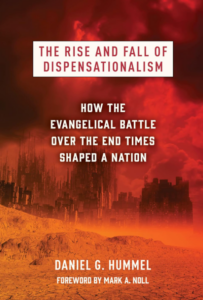
Author: Hummel, Daniel
Genre: Theology - Dispensationalism
Tags: Dispensationalism
Series:
Rick Shrader‘s Review:
Daniel Hummel’s 2023 book has caused quite a stir in the last year both within dispensationalism and anti-dispensationalism. The book is well written, typically documented, and controversial enough to hold the reader’s attention. I found the book entertaining at one point and totally frustrating at the next. Hummel’s basic points seem to be that dispensationalism, though not unheard of before Darby, did for all practical purposes begin with Darby and was greatly enlarged by Scofield. He believes that Darby’s “two key novelties” were a pretribulational rapture position (which he calls “new premillennialism,” part 1 of the book) and a parenthesis period between Daniel’s 69th and 70th weeks (p. 22-23). These he separates from “old premillennialism” as later reemphasized by George Ladd’s “historic premillennialism.” For most of the book the pretribulational rapture position is viewed with little theological respect and as part of the commercialization of 20th century dispensationalism. Oddly, the basic argument against an imminent rapture seems to be that it hasn’t happened yet. Hummel does give more credence to the “scholastic dispensationalism” (part 2 of the book) of Dallas, Grace, and Talbot Theological Seminaries and their founders and well-known theologians, although he never interacts biblically with their dispensational theology. To be fair, Hummel is an historian and keeps that as his focus.
A large portion of the book is taken up with what Hummel calls “pop dispensationalism” (part 3 of the book) which he places between 1960 and 2020. Starting with Hal Lindsey’s The Late Great Planet Earth, Hummel pictures the coming “fall” of dispensationalism as the commercialization of the movement by Lindsey and many who followed his lead such as LaHaye and Jenkin and the Left Behind series, John Hagee, and even David Hunt. Here he inserts, either directly or indirectly, the Jesus People, CCM, televangelism, charismatic revival, the mega church movement, free grace, and even Christian nationalism. In my opinion, though Hummel may be right in his assessment of “pop” dispensationalism’s popularity, all of these were stretched in their importance to dispensationalism’s history as a biblical doctrine. In fact, his disdain for this effect on the twentieth century could be seen as jealousy of the movement’s success or a deploring of a huge portion of Christian people. Having lived throughout this time frame (I was born in 1950), these things had little to no effect on my training, teaching, and pastoring as a traditional dispensationalist. Most of what Hummel calls “pop dispensationalism” was a humoring side-show.
Hummel does give credit to “scholastic dispensationalism,” especially Dallas Seminary with John Walvoord and Charles Ryrie, but he fails to give credit (except by scant mention) to the schools, authors, and scholars that still maintain their biblical (yes, “scholastic”) dispensationalism. More space is given to detractors such as Philip Mauro and even Tony Campolo, among a long list of “who cares?” I would conclude that what he admits is “scholastic” dispensationalism is historically what dispensationalism matured into, what is still taught in numerous Bible colleges and seminaries, and what dispensationalism still is. The report of dispensationalism’s demise is greatly exaggerated.
